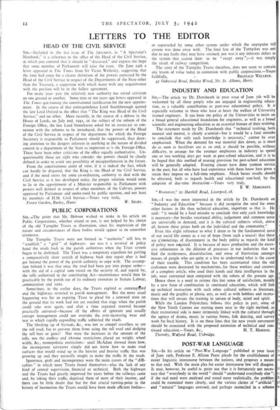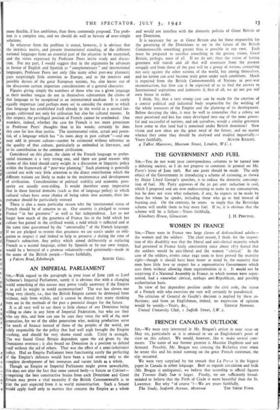POST-WAR LANGUAGE
Sta,—In his article on "Post-War Language" published in your issue of June 19th, Professor E. Allison Peers pleads for the establishment of easier linguistic intercourse between the nations, and proposes a means to that end. With the main plea for easier intercourse few will' disagree. It may, however, be useful tc point out that it is fortunately not neces- sary that "everybody in the world" should "understand everybody else"; if the real need were analysed and stated more realistically, the problem could be examined more clearly, and the various claims of "artificial" and " natural " languages assessed, and perhaps reconciled in a scheme more flexible, if less ambitious, than those commonly proposed. Tne prob- lem is a complex one, and we should do well to beware of over-simple solutions.
In whatever form the problem is stated, however, it is obvious that the intrinsic merits, and present international standing, of the different national languages form an essential part of the situation to be examined, and the views expressed by Professor Peers invite study and discus- sion. For my part, I would suggest that in the arguments he advances in favour of English and Spanish as " complementary " and international languages, Professor Peers not only (like many other post-war planners) pays surprisingly little attention to Europe, and to the interests and possible desires of the great European nations, bui also leaves out of the discussion certain important considerations of a general character.
Figures giving simply the numbers of those who use a given language as their mother tongue do not in themselves substantiate the claims of that language to be recognised as an international medium It is surely equally important (and perhaps more so) to consider the extent to which that language has established itself already in the world as a second lan- guage, cultivated not only for utilitarian but also for cultural reasons. In this respect, the privileged position of French cannot be overlooked. One wonders, indeed, whether the case for French is not more prominent in Professor Peers" thoughts than in his words; certainly he does this case far less than justice. The international value, actual and poten- tial, of a language which has "its roots deep in past culture "—and one may add in present culture—cannot be estimated without reference to the quality of that culture, particularly as embodied in literature, and to its contribution to the common civilisation.
Considered on this plane, the claim of the French language to prefer- ential treatment is a very strong one, and there are good reasons why claims of this kind should carry weight in a discussion of linguistic policy within the framework of "post-war planning." Such planning is generally carried out with very little attention to the direct contribution which the different nations are likely to make to the maintenance and development of civilisation. Considerations of political stability and economic pros- perity are usually over-riding. It would therefore seem imperative that in those limited domains (such as that of language policy) in which cultural values have some chance of being taken into account, their im- portance should be particularly stressed There is also a more particular reason why the international status of French should be of concern to us. Our country is pledged to restore France "in her greatness" as well as her independence. Let us not forget how much of the greatness of France lies in the hold which her culture has gained in the civilised world, a hold which is reflected and at the same time guaranteed by the " universality " of the French language. If we are pledged to restore that greatness we are surely under an obli- gation to respect it and indeed to help to preserve t during the time of France's subjection. Any policy which aimed deliberately at replacing French as a second language, either by Spanish or by our own tongue, would be a betrayal of a promise voluntarily—and generously—made in the name of the British people.—Yours faithfully,



























 Previous page
Previous page